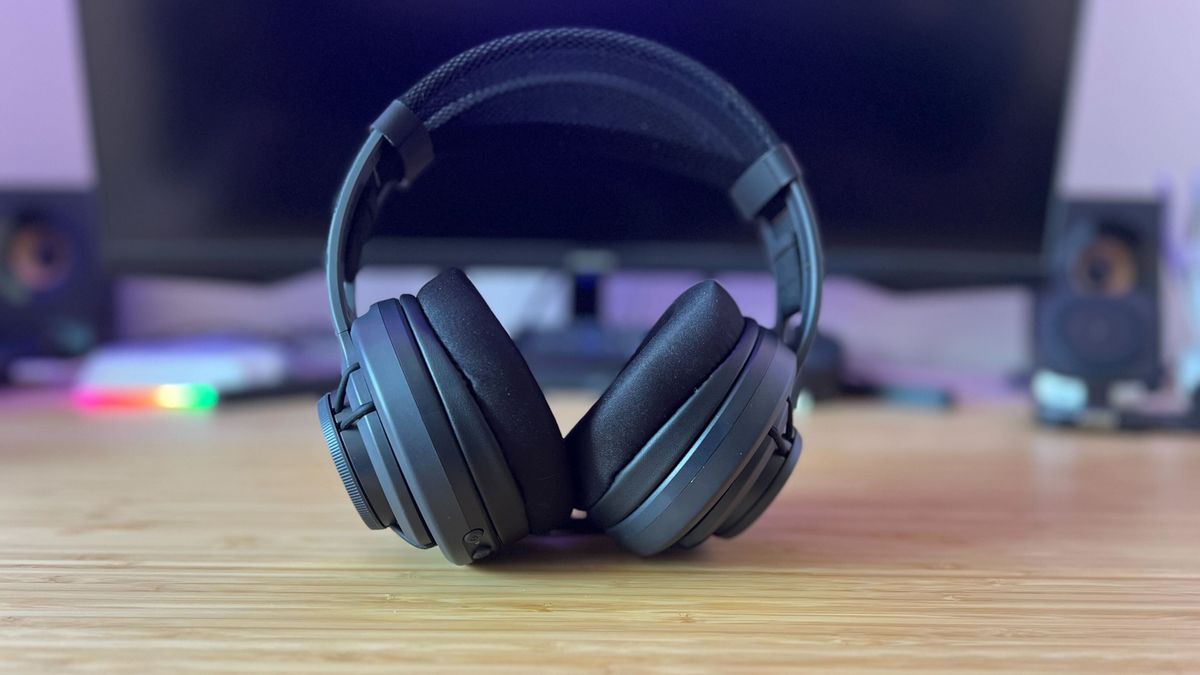12DOVE Verdict
The Turtle Beach Atlas Air is a rare beast, a wireless open-back headset with excellent sound quality, actually handy microphone and volume features, and an incredibly comfortable form factor. This is both a pleasure on the noggin and in the ears.
Pros
- +
Extremely comfortable
- +
Subtle aesthetic
- +
Rare open-back wireless features
- +
Natural, expansive soundstage
- +
Richly textured audio
Cons
- -
Less premium look and feel
- -
Open back isn’t for everyone
Why you can trust 12DOVE
Turtle Beach is back at it again, dropping higher-end devices after years of catering to entry-level and lower mid-range prices. The Turtle Beach Atlas Air is the latest in this more premium category, combining a wireless connection with an open-back design for a fairly rare experience. There’s plenty going on here that sets the device apart from the competition (both from a closed-back and open-back standpoint), but going up against audiophile heavyweights is no easy task.
The Corsair Virtuoso Pro was previously the best gaming headset with an open-back design but its reliance on cables (a lot of cables) and its strangely flat mids mean there’s ample opportunity for Turtle Beach to wiggle in here - and that’s exactly what the Atlas Air has done.
| Price | $179.99 / £159.99 |
| Connection | 2.4GHz / Bluetooth / Wired |
| Drivers | 40mm |
| Frequency response | 20Hz - 40kHz |
| Microphone | Uni-directional, detachable, flip-to-mute |
| ANC | None |
| Controls | Power, volume, Bluetooth, QuickSwitch (+ inline volume on cable) |
| Battery | Up to 50 hours |
| Weight | 301g |
| Compatibility | PC, PlayStation, Xbox (Wired), Nintendo Switch, mobile |
Design
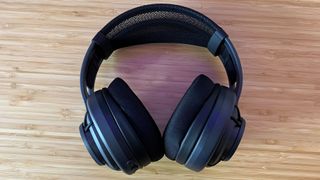
I’m testing the Atlas Air during a rare warm spell here in England. My body has also decided to remind me I’m just a year away from 30 which means a strange back pain that has seemingly sprung from sorting the recycling at the weekend. That means I’m sitting in a hot room with a hot water bottle, and the Turtle Beach Atlas Air is exactly the headset I need. It's light, cool, comfortable, and keeps everything feeling breezy, natural, and relaxed.
The Atlas Air doesn’t want you know it’s there. This is an incredibly well-designed headset, featuring a mesh headband design that melts into the crown and plush, light cushions on each side. It’s by far the most comfortable device I’ve ever used with barely any pressure on the head itself. Of course, that’s all helped by the fact that there’s a very light clamp force (I could jiggle the headset around on my head if I really tried, but it otherwise still remained stable), and extra give in the padding itself. That meant my head was free from headband strain and my ears were housed neatly in a set of malleable cushions.
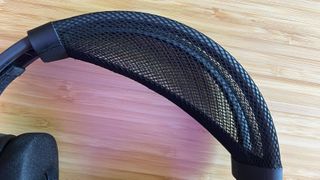
Each cup is actually suspended from the headset itself, using what Turtle Beach calls the ‘world’s first floating earcup design’. It essentially means that each cup is held onto the frame with a set of six elastic bands rather than less flexible aluminum or plastic yokes. That means each side can nestle straight into your head shape without being constricted by the frame itself. These bands all look pretty snug, and they have a reassuring thickness to them but their durability is yet to be tested long-term.
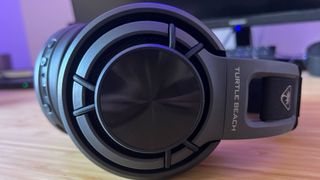
At 301g, the Atlas Airs aren’t the lightest on the market - the SteelSeries Arctis Nova 5X comes in at 277g and the Razer BlackShark V2 Hyperspeed is just 280g. However, they’re certainly in the lightweight category, adding to the overall comfort even more.
The aesthetic itself is fairly subdued. You won’t find any RGB lights and the matte black plastic feels like standard fare for Turtle Beach. The plastic itself is slightly thinner than you might expect from a gaming headset taking aim at a fairly premium price category, but it achieves its low weight well even if it doesn’t look or feel like a $180 piece of kit. The headband itself is adjustable via velcro, but fit me perfectly the first time - testing on someone with a larger head showed that customization is particularly easy and there’s a decent range of movement in the band altogether.
Features
The first thing you need to know about the Turtle Beach Atlas Air is that it’s an open-back headset. That means the drivers themselves are free to blast sound in both directions without being locked down by plastic coverings on the side of each cup. In practice, open-back headsets provide a more natural soundscape without the distortions that many closed-back devices suffer from - it’s also a far more relaxing way of listening, without the claustrophobic sense of being glued to a set of speakers.
That means the Atlas Air allows sound to flow in both directions, though, which means it’s not the best headset to use in busier environments. Don’t let that Bluetooth connectivity fool you - this isn’t a dog-walking set of headphones. That design does make for a more comfortable chat experience, or if you’re a streamer, as you’re able to naturally hear your own voice.
Open-back headsets aren’t as readily available as closed-back models, and wireless devices are even rarer. They exist, but generally as audiophile headphones and that means you’re paying for an audio quality that you might not need while losing mic features. The Atlas Air is the first dedicated wireless gaming headset with an open-back design I’ve personally seen.
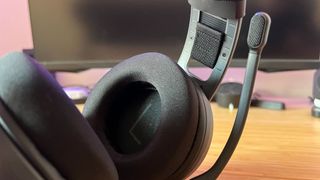
Packing both 2.4GHz and Bluetooth connections, this isn’t just a wireless headset, it’s fully inline with 2024’s expectations and even packs a 50-hour battery. All this tech is packed into the cups themselves, with two extra circles over each side, unlike the Corsair Virtuoso Pro which features full open grills.
All of the controls are packed onto the left-hand side, with the power, Bluetooth pairing, and QuickSwitch buttons nestled underneath the main cup. They’re not particularly easy to discern when wearing the headset, but equally you don’t really need these functions while in-game. Like the Turtle Beach Stealth Pro, volume controls are spread across the side of the cup in a dedicated dial. That means quick and easy adjustments without having to fiddle around your ear - it’s a personal highlight and a feature I wish more headsets added.
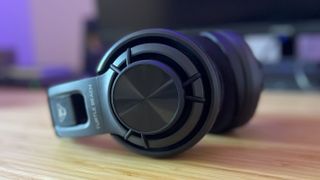
The Atlas Air does one more thing differently. The microphone is very much a best of both worlds affair. It’s detachable, so you can leave it in the box if you never jump on comms and don’t have to worry about it sitting right in front of your face. But it’s also flip to mute once it is installed. That’s not something I’ve seen before, but it makes all the difference in everyday life, especially if you use your headset for single-player and multiplayer games in equal measure.
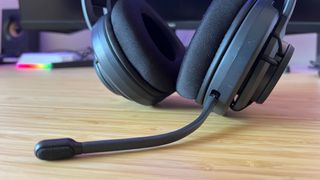
While the fully acoustic Corsair Virtuoso Pro doesn’t benefit from any additional customization options, the Turtle Beach Atlas Air has a whole suite of controls in the Swarm 2 software. Not only is this a robust 10-band EQ system for PC, but it’s also available on mobile for on-the-go tweaks as well. The app offers all the usual features; chat-mix sliders and sidetone monitoring as well.
This is also where you’ll find Superhuman Hearing, Turtle Beach’s FPS-first EQ preset which aims to enhance more competition-critical sounds like footsteps, gunshots, and reloads while killing other sounds. The result has never been particularly pleasant and generally muddies the soundstage with oddly distorted, unnatural effects. The result is even worse in this open-back format which places so much emphasis on natural sound. I don’t know how much of the final price tag goes into enabling this feature, but it’s likely not a significant amount. No biggie if you’re not fussed about competitive play, then, but worth considering if this extra feature brought your attention to the Atlas Air in the first place.
Performance
I’ll cut straight to the chase. The Turtle Beach Atlas Air sounds fantastic - it wasn’t as eye-wideningly revolutionary for me as the Corsair Virtuoso Pro was - but it’s still a cut above the rest. Everything is well balanced, with lower ranges pounding away underneath delicately handled treble tones and an impressively detailed mid-range. The additional space of an open-back design helps the Atlas Air massively here - naturally this is going to have a wider, less processed soundstage. However, there are plenty of open back headsets that still have emphasized basslines reverberating through your skull or clustered mids.
The Atlas Air performs particularly well for itself across a range of genres as well. The gentle melodies of Octopath Traveller were a delight with so much freedom for twinkly detailing and marching percussion. Fallout 4’s battlefields were expanded when I returned to mop up some side quests, with visceral explosions in the distance and markable enemies scurrying around the maps. Waking up the PS5, I found that The Last of Us Part 1’s echoes were pleasantly terrifying and I almost had to tap out of the hotel set piece in Part 2. Everything was represented in gorgeous detail and with a robust texture, all without the manufactured feel of a more traditional headset.
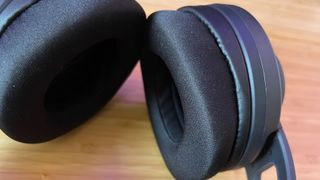
As mentioned earlier, the graphene drivers of the Virtuoso Pro did give Corsair’s model a slight edge in my head-to-head testing. The Atlas Air has a wide soundstage, the Virtuoso Pro has a slightly wider one. I already thought Corsair had a slightly flattened mid-range, and the two headsets compete equally here. While the Atlas Air was able to pump more power into a clustered soundstage, like the great plains of Horizon Forbidden West, therefore bringing lower tones to the forefront a little more, the Virtuoso Pro revelled in the higher end of this range, picking out screeches of metal better than the clunk of a machine’s footsteps. Considering there’s plenty of power in the Pro’s audio, I’d take the extra detail of a higher range over the grunt of a lower one when put side by side.
That’s an incredibly nitpicky point, and more of an attempt at quantifying why I felt slightly more drawn to Corsair’s sound than Turtle Beach’s. When all’s said and done you’re certainly getting your money’s worth from a pure audio standpoint here.
The microphone is… fine. I had some issues with Windows 11 recognizing it as an input at first, which could be down to a waiting firmware update or simply plugging it in wrong. Once fixed, my teammates could hear me - and unless you’re going for a streaming or podcasting career that’s all you really need.
Should you buy the Turtle Beach Atlas Air?
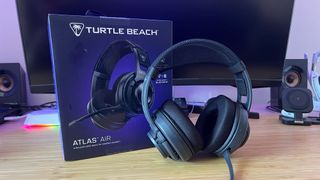
With its excellent feature set and incredibly comfortable design, the Turtle Beach Atlas Air is the best open-backed headset I’ve tested yet. Yes, its audio quality is ever so slightly lagging behind the Corsair Virtuoso Pro - but not the extent that I would forego that wireless connection and ergonomic design. Taken in isolation this headset sounds great for single player and competitive experiences alike, and still manages to bring all the benefits of an open-back design with it as well. The so-so microphone does mean I’d still recommend the Virtuoso Pro to streamers before the Atlas Air.
Of course, there’s always a big caveat to recommending a headset like this. You have to really know you want an open back headset before buying one. Sound leakage is real, and it works both ways. If you play in a busier environment or you want your $179.99 investment to see you through morning commutes at the same time you’ll need to look elsewhere. If you play your games as God intended, locked away in a dark room far, far away from society this is going to be an excellent buy.
| Specs | Turtle Beach Atlas Air | Corsair Virtuoso Pro |
|---|---|---|
| Price | $179.99 / £159.99 | $199.99 / £169.99 |
| Connection | 2.4GHz / Bluetooth / Wired | Wired |
| Drivers | 40mm | 50mm graphene |
| Frequency response | 20Hz - 40kHz | 20Hz - 40kHz |
| Microphone | Uni-directional, detachable, flip-to-mute | Omnidirectional |
| ANC | None | None |
| Controls | Power, volume, Bluetooth, QuickSwitch (+ inline volume on cable) | None |
| Battery | Up to 50 hours | N/A |
| Weight | 301g | 338g |
| Compatibility | PC, PlayStation, Xbox (Wired), Nintendo Switch, mobile | PC, PlayStation, Xbox, Nintendo Switch, mobile |
How we tested the Turtle Beach Atlas Air
I spent two weeks testing the Turtle Beach Atlas Air, with the first week spent testing alongside the Turtle Beach Stealth 600 Wireless Gen 3 and the second testing against the Corsair Virtuoso Pro. In that time I primarily played on PC, running Fallout 4 and Doom Eternal on a gaming laptop via 2.4GHz and Octopath Traveler on Asus ROG Ally via Bluetooth. I also tested across The Last of Us Part 1 and 2 as well as Horizon Forbidden West on PS5 as well. For more information on how we test gaming headsets, check out the full 12DOVE Hardware Policy.
We’re also rounding up all the best PS5 headsets and best Xbox Series X headsets for more console audio, or check out the best PC headsets on the market.

Managing Editor of Hardware at 12DOVE, I originally landed in hardware at our sister site TechRadar before moving over to GamesRadar. In between, I've written for Tom’s Guide, Wireframe, The Indie Game Website and That Video Game Blog, covering everything from the PS5 launch to the Apple Pencil. Now, i'm focused on Nintendo Switch, gaming laptops (and the keyboards, headsets and mice that come with them), PS5, and trying to find the perfect projector.

How long is Atomfall? This is the time to beat it

As Krafton irons out the InZoi bugs, devs "recommend avoiding repeated remarriage and, if necessary, proceeding only when there are no children involved"

Rooney Mara's new kitchen drama that's being called "The Bear on steroids" is a tense, darkly funny take on the American dream

